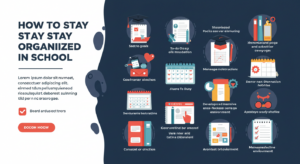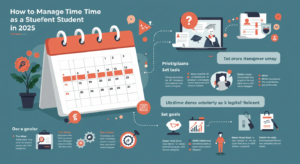
Student life includes the necessity of examinations even though these assessments should not create emotional distress. Strategic preparation methods enable you to prepare well at the same time you maintain your composure. The following piece includes useful methods to improve your learning effectiveness while also showing guidance regarding time management for test preparations along with explanations for decreasing test-related tension. Let’s dive in!1. Start Early and Plan Ahead
Students who postpone work experience have the highest level of stress during exam times. Develop a timeline for covering your syllabus by dividing it into workable sections. Schedule your study time according to subjects without deviating from your prepared schedule. When you start your studies in advance, you obtain sufficient time to practice your topics before rushing to memorize content at the last moment.
2. Organize Your Study Space
The presence of excessive clutter causes mental distractions within a study space. Maintain a spotlessly organized workspace that lacks any potential sources of distraction. Before you start your studies, collect every study-related item, such as your notes, textbooks, and stationery, together with a water bottle. A tidy environment creates better mental concentration.
3. Use Active Learning Techniques
Instead of passively reading through your notes, engage in active learning. Try techniques like:
- Mind mapping to visualize concepts.
- Practice tests to simulate exam conditions.
- Teaching someone else to reinforce your understanding.
Active learning not only improves retention but also boosts your confidence.
4. Take Regular Breaks
Studying for hours without breaks can lead to burnout. Follow the Pomodoro Technique: study for 25 minutes, then take a 5-minute break. After four cycles, take a longer break (15-30 minutes). This keeps your mind fresh and focused.
5. Stay Healthy
Your physical health directly impacts your mental performance. Here’s how to stay in top shape:
- Sleep well: Aim for 7-8 hours of sleep each night.
- Eat nutritious meals: Include brain-boosting foods like nuts, fruits, and whole grains.
- Exercise regularly: Even a short walk can reduce stress and improve concentration.
6. Practice Mindfulness and Relaxation
Feeling overwhelmed? You should practice mindfulness methods that include deep breathing alongside meditation or yoga. The practices cause your mind to become calmer and enhance your ability to focus. A short amount of daily mindfulness practice extending from 5 to 10 minutes will yield significant benefits.
7. Stay Positive and Visualize Success
Having a positive mental state stands as essential when coping with examination anxiety. Affirm that you “am prepared and capable” instead of stating “I can’t do this” to yourself. Visualize yourself earning an A on your exam because this visualization helps increase your confidence and lowers your exam-related stress.
8. Seek Help When Needed
When you face difficulties with a certain subject, do not delay seeking support from others. Contact teachers along with classmates through either classroom assistance or utilize online learning resources. A small amount of guidance can eliminate misunderstandings while preventing you from spending numerous hours in stress.
FAQs About Exam Preparation
Q1: How far in advance should I start studying for exams?
The best start time for exam preparation should be between four to six weeks preceding the exam date. Desired result: 4-6 weeks before the test provides students enough duration to learn all material while preparing for exams.
Q2. To memorize information, what approach is most effective?
The optimal memory methods include spaced repetition together with active recall paired with mnemonic devices. Smaller information chunks enhance the chances of memorization.
Q3. How can I stay motivated while studying?
Set goals that are within reach and choose small rewards that follow goal completion. Your motivation to study can be maintained through the help of friends through study sessions or study groups.
Q4: What should I do if I feel overwhelmed?
During overwhelming situations, spend a few moments to rest while practicing deep breathing with follow-up phone contact to a trusted person. Cutting complex work tasks into successive segments makes individual pieces appear smaller, thus easier to handle.
Q5: Is it okay to take breaks while studying?
A: Absolutely! People who take scheduled breaks in their work achieve better concentration and protect themselves against exhaustion. Time your breaks properly since uncontrolled breaks can become procrastinating activities.
Q6: How can I manage my time during the exam?
Begin your exam with questions you understand best after you complete a full review of the paper, then dedicate time sections to each inquiry. Monitoring the time helps you prevent devoting excessive time to a single question.
Final Thoughts
Exam preparation should not cause feelings of stress. Your preparation combined with organization and wellness management should enable you to enter exams feeling confident. A perfectionist approach is unnecessary since you should focus on achieving your personal best level. Good luck!
Which techniques do you use to maintain calmness during test periods? Please post your examination preparation techniques through comments below.











Leave a Reply